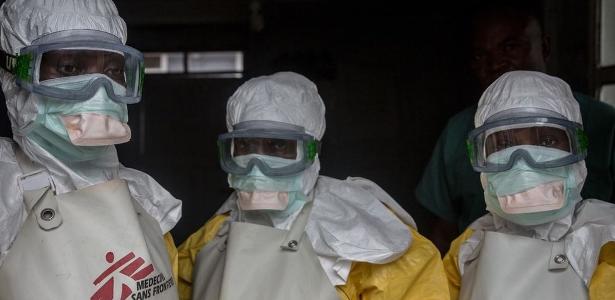People who survived Ebola virus It is suggested that during an epidemic it can relapse and cause an outbreak at least five years after infection. study.
“We clearly show that even after nearly five years (…), new epidemics can emerge through transmission by infected humans during a previous epidemic,” said a study published on Wednesday (15) in the scientific journal. temper nature.
The authors came to this hypothesis after analyzing virus samples from twelve patients infected during the last epidemic this year in Guinea.
The epidemic ended in June and left six dead. The number is low if we take into account that this disease is a relatively low infectious but very fatal disease.
The epidemic that occurred years earlier was the deadliest, the worst in the history of the virus, killing more than 11,000 between 2013 and 2016 in Guinea and neighboring countries.
However, in five years, the virus has changed little. This is the conclusion of researchers from three laboratories (two in Guinea and one in Senegal), which determined the sequence of viruses that led to the 2021 epidemic; That is, they made a detailed picture of its genome.
It was a surprise: one would expect the virus to mutate much more over the years.
why? How do epidemics of this disease arise?
The virus spreads in some species of bats, which transmit it to other animals, such as monkeys. This, in turn, affects people.
Most epidemiologists believe that this is how epidemics caused by the Ebola virus arise. But the study published on Wednesday casts doubt on him.
If the 2021 pandemic was caused by animal-to-human transmission, the virus would likely be very different from 2013-2016.
In this case, it may come from another strain that was in the chain of infection (between animals and then humans) that has undergone several mutations.
stigma risk
The study authors estimate that the virus remained in the bodies of infected patients years ago. It could have been activated again, causing a pandemic.
It’s not an entirely new hypothesis. It was already known that the virus can remain in the body. Remarkably, it is able to cause a new disease long after the first infection.
“It’s a new paradigm: the possibility of transmission from an infected person during an epidemic could be the starting point of a new outbreak,” Alpha Keita, one of the lead authors, explains to AFP.
There is no conclusive evidence that this is the case, but the data published on Wednesday tilted in that direction. Some researchers who were not involved in the study think so, too.
They are “remarkable and significant results”, assesses Trudy Lang, a global health expert at Oxford University, contacted by AFP through the British Science Information Centre.
“It seems that this new epidemic was a re-emergence and not a new one,” he says.
But he says there are “a lot of doubts”. “What makes a latent infection an infection in general and how should these conditions be treated?”
The hypothesis of a latent virus in some survivors has public health implications, as previous patients will need to be followed up.
The study’s authors and other researchers fear that survivors are living with the stigma of dangerous individuals.



![[VÍDEO] Elton John’s final show in the UK has the crowd moving](https://www.lodivalleynews.com/wp-content/uploads/2023/06/Elton-John-1-690x600.jpg)


More Stories
The Director of Ibict receives the Coordinator of CESU-PI – Brazilian Institute for Information in Science and Technology
A doctor who spreads fake news about breast cancer is registered with the CRM of Minas
The program offers scholarships to women in the field of science and technology